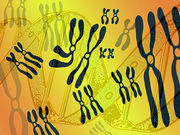Study suggests link between family stress and potential damage to DNA
WEDNESDAY, Oct. 5, 2016 (HealthDay News) — Adults who have experienced stress as children appear to have an increased risk of shorter telomeres, according to research published online Oct. 3 in the Proceedings of the National Academy of Sciences.
Eli Puterman, Ph.D., director of the Fitness, Aging & Stress Lab at the University of British Columbia in Vancouver, Canada, and colleagues analyzed saliva DNA samples from 4,598 people aged 50 and older who are participating in the U.S. Health and Retirement Study. The study participants had been asked about stressful events throughout their lives, both as children and adults. The researchers examined these events and compared them against the likelihood that a person would have short telomeres.
Overall, a person with a lifetime of stressful events had a slightly increased risk of shorter telomeres, even after the researchers accounted for other factors that affect cellular aging, such as smoking, education, income, age, weight, and medical history. The childhood events seemed to be driving the increased risk of rapid cellular aging, rather than stress endured in adulthood, Puterman told HealthDay. Each significant stressful event in a person’s childhood appeared to increase the risk of shorter telomeres by 11 percent.
These events can include drug or alcohol abuse by parents, physical abuse, trouble with the law, having to repeat a grade, or financial hardships in the family, according to the report. “We found those psychological or social types of stressors seem to be driving the effect the most in this particular study, more so than financial stressors,” Puterman said.
Full Text
Copyright © 2016 HealthDay. All rights reserved.








